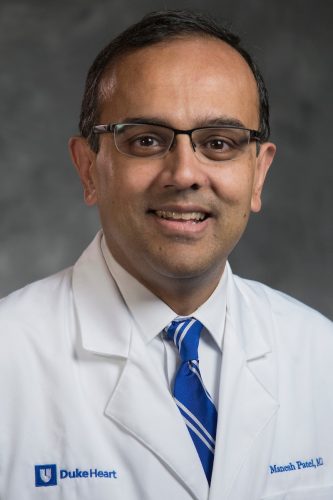Highlights of the week:
Happy Lunar New Year!
 Yesterday marked the beginning of the Lunar New Year, a 15-day festival marking the beginning of the new year based on the lunar or lunisolar calendar. It is one of the largest holidays in the world and is celebrated across East Asia.
Yesterday marked the beginning of the Lunar New Year, a 15-day festival marking the beginning of the new year based on the lunar or lunisolar calendar. It is one of the largest holidays in the world and is celebrated across East Asia.
2024 is the Year of the Dragon. To all Duke Heart faculty and staff celebrating the Lunar New Year, we wish you great happiness and prosperity!
New Gift to Support Heart Transplant Patients and Their Families
A $1.5 million legacy gift from an anonymous family will help support Duke Heart transplant patients.
The donors know firsthand what it is to have a family member with a failing heart, and what a miracle a heart transplant can be. They also know how arduous the transplant journey is.
“Our experience was really, really good,” a member of the family said. “But one of the things we saw around us was how much the financial stress impacted families. Our belief that ‘to whom much is given, of them much is expected’ meant we wanted to make a meaningful gift, and that it was important to do so in a way that will directly relieve some of the strain on patients and their families.”
For the donors that meant directing their gift to help with the financial challenges families undergoing transplantation face.
“We saw all the challenges that were outside the medical system that insurance doesn’t pay for. And so that really led us to target this gift to help cover those expenses. Families might need transportation, they might need lodging, or something else. And they may not be as fortunate as we are, whether it be to live here or financially be able to take care of those things. We wanted to provide something that would help those families,” another family member added.
Over the last two years, Duke has performed more heart transplants than any other center in the world, helping patients from 10 different states. Duke also accepts high-risk patients who have been turned away from other centers.
 “This gift provides much-needed support to the families being seen at Duke Heart,” said Chet Patel, MD, vice chief for outreach and network development. “Many patients undergoing complex care such as heart transplant sometimes have to make choices between personal recovery and family wellbeing. A lot of these stressors are financial due to costs not covered by health insurance such as living expenses and health-care-related travel. With the help of generous families who have been through these challenges, we can reduce these stressors and allow the patients to focus on healing.”
“This gift provides much-needed support to the families being seen at Duke Heart,” said Chet Patel, MD, vice chief for outreach and network development. “Many patients undergoing complex care such as heart transplant sometimes have to make choices between personal recovery and family wellbeing. A lot of these stressors are financial due to costs not covered by health insurance such as living expenses and health-care-related travel. With the help of generous families who have been through these challenges, we can reduce these stressors and allow the patients to focus on healing.”
Duke Heart is one of the world’s premier heart and vascular centers, treating more than 65,000 patients

annually. It has the largest heart transplant program in the nation and is recognized both nationally and internationally for its advanced research and treatments. Duke has performed numerous heart transplant ‘firsts’ as well as other breakthrough procedures that have vastly improved outcomes for those with failing hearts.
“Our overriding goal at Duke Heart is to improve and innovate care and deliver those therapies as close to patients in their own communities as possible,” said Manesh Patel, MD, Division Chief of Cardiology and director of Duke Heart. “We are grateful for this family’s gift that will help reduce the barriers to transplant care.”
Duke’s Advanced Heart Failure Team Celebrates Recent Milestones
The Duke Heart Advanced Heart Failure Team gathered recently at the Washington Duke Inn to celebrate two significant milestones – the transplantation of 161 hearts in a single year and the transplantation of the 2000th heart at Duke.
The very first heart transplant at Duke was completed in 1985. The volume of heart transplants performed at Duke University Hospital last year was a record not only for Duke but for any U.S.-based program, according to OPTN data.
transplants performed at Duke University Hospital last year was a record not only for Duke but for any U.S.-based program, according to OPTN data.
Congratulations, team – and Happy Heart Failure Awareness Week to all!
Kraus to Receive ACSM Citation Award
 Duke cardiologist and rehabilitation specialist, William Kraus, MD, has been selected as an American College of Sports Medicine (ACSM) Citation Award winner for 2024. The prestigious Citation Award recognizes distinguished individuals who have made significant contributions to sports medicine and/or to the exercise sciences.
Duke cardiologist and rehabilitation specialist, William Kraus, MD, has been selected as an American College of Sports Medicine (ACSM) Citation Award winner for 2024. The prestigious Citation Award recognizes distinguished individuals who have made significant contributions to sports medicine and/or to the exercise sciences.
Bill is an outstanding clinician-scientist, mentor, volunteer, and leader in the fields of molecular biology, genetics, integrative human exercise physiology, and metabolism. He joins a highly regarded group of previous winners – many of whom are considered to be the ‘godfathers of exercise physiology’.
Kraus will be honored with the award at the 2024 ACSM Annual Meeting in Boston, May 28-31. He is among six recipients. To see the full list, visit the ACSM award site.
Congratulations, Bill! Well-deserved!
New scientific research will test PREVENT risk calculator among diverse groups
Research teams from Duke University, New York University, and Northwestern University Feinberg School of Medicine will work together to assess the accuracy of the American Heart Association’s (AHA) new PREVENT risk calculator with funding from the AHA’s De-biasing Clinical Care Algorithms project. The de-biasing project is funded by a grant from the Doris Duke Foundation to study the role of race and ethnicity in clinical equations and their impact on equity in disease diagnosis, healthcare delivery, or health outcomes.
Each team received a $150,000 one-year research award to further study how the risk calculator performs among people of various ages, racial and ethnic backgrounds, locations, and socioeconomic levels. The calculator was initially validated using health data from more than 3 million people. The new research intends to test it against even larger datasets.
The AHA PREVENT risk calculator is a new tool for clinicians to help people understand their risk for developing heart disease, stroke, or heart failure. It estimates cardiovascular disease risk based on health factors that assess cardiovascular, kidney, and metabolic health. Unlike the current standard for risk prediction, called the Pooled Cohort Equations (PCEs), a person’s race is not included in PREVENT as a factor in determining cardiovascular risk. Previous equations included race as a surrogate for the health effects of structural and systemic inequities, such as racism, that influence cardiovascular risk. The American Heart Association developed the PREVENT calculator with data on people from diverse races and ethnicities and includes additional health measures as well as a social index to predict risk more accurately.
The research teams will work in collaboration to assess the discrimination and calibration, cost-effectiveness, and accuracy of PREVENT among different sociodemographic groups using health system data from across the U.S. They will also see how it performs compared to the PCEs.
of PREVENT among different sociodemographic groups using health system data from across the U.S. They will also see how it performs compared to the PCEs.
The research projects began January 1, 2024, and include:
- Evaluation of Cardiovascular Risk Prediction Equations across Diverse Sociodemographic Subgroups – co-led by Michael J. Pencina, PhD, chief data scientist for Duke Health, and Chuan Hong, PhD, an assistant professor of biostatistics and bioinformatics at Duke.
- Evaluating and Validating Equations Across All Race and Ethnicities – led by Sadiya S. Khan, MD, MSc, a cardiovascular epidemiologist at Northwestern University Feinberg School of Medicine in Chicago.
- Debiasing Clinical Care Algorithms – CKD-PC Analysis Core – led by Josef Coresh, MD, PhD, founding director of the Optimal Aging Institute and a professor of population health and medicine at the New York University Grossman School of Medicine in New York.
Khan, Coresh, and Pencina were part of the volunteer writing group that developed the PREVENT equations. PREVENT was created based on data from more than 3 million people, and then validated in a different dataset of more than 3 million people to show that it is accurate in people of various ages, ethnicities, and geographic areas. This new collaborative project will further test how risk prediction with PREVENT applies to a diverse sample of adults and examine accuracy across race and ethnicity groups in the U.S.
Snider to Receive AmSECT National Award of Excellence
 Please join us in congratulating Duke perfusionist Scott Snider! We learned this week that he has been selected as the winner of the 2024 American Society of ExtraCorporeal Technology (AmSECT) Award of Excellence.
Please join us in congratulating Duke perfusionist Scott Snider! We learned this week that he has been selected as the winner of the 2024 American Society of ExtraCorporeal Technology (AmSECT) Award of Excellence.
This award is presented to a perfusionist who has demonstrated excellent work exemplifying creativity and intellectual originality in extracorporeal technology. The award is presented for excellence in any area such as education, continuing education, research, publication, or leadership, according to AmSECT.
Snider will receive the award during the 62nd AmSECT International Conference which is scheduled for March 20-24 at the Sheraton New Orleans Hotel in New Orleans, LA.
Congratulations, Scott!
Duke Kannapolis Community Registry Marks Milestone with Industry License
The Duke Clinical and Translational Science Institute (CTSI) announced last week that Personal Genome Diagnostics is the first company to obtain a license for materials from the MURDOCK Study, a unique community registry and biorepository managed by CTSI and based at Duke’s Kannapolis research site in Kannapolis, NC. The registry and biorepository include samples and associated data from more than 12,000 participants.
Licensing in support of industry research and development, in collaboration with the Duke Office of Translation and Commercialization (OTC), is one of a broad range of uses of the registry available through the Biorepository Transformation Initiative. This initiative makes thousands of biospecimens and associated clinical outcomes data available to researchers both inside and outside of Duke. Duke investigators can easily explore the cohort with just a few clicks using the data exploration tool. The storefronts summarize data and samples at a glance for all interested researchers.
Through the initiative, Duke investigators have recently advanced biomarker research in the areas of heart failure, Alzheimer’s, and diabetes, and the Duke School of Nursing has obtained over 20,000 biological samples and linked data to advance research in health equity and social drivers of health.
Researchers who are interested in accessing samples for academic collaboration or commercial scientific exploration can complete this brief interest form, as a first step in the process.
Congrats, CTSI!
Shout-out to Heart Nursing Leaders!
 On Tuesday, February 6, several Duke Heart leaders (pictured below) for the Cardiothoracic Step-Down Units attended the Watts College of Nursing Career Fair. They had the opportunity to meet with over 30 potential candidates and establish shadow experiences. They are hoping this will yield new Heart team members!
On Tuesday, February 6, several Duke Heart leaders (pictured below) for the Cardiothoracic Step-Down Units attended the Watts College of Nursing Career Fair. They had the opportunity to meet with over 30 potential candidates and establish shadow experiences. They are hoping this will yield new Heart team members!
Reminder: Tier 2 Status
We are currently in Tier 2 visitation status throughout Duke University Health System. Information is available on Duke Health Now.
Upcoming Events & Opportunities 
- Duke Culture Survey: Jan. 29-Feb.17
- February is Heart Month and Black History Month.
- February 7-14 is Congenital Heart Defect Awareness Week
- February 11-17 is Heart Failure Awareness Week
- Wednesday, Feb. 14 is National Donor Day
2024 Lefkowitz Distinguished Lecture
Feb. 13: Immunology of Long COVID with Akiko Iwasaki, PhD of Yale. Noon, Great Hall of Trent Semans Center for Health Education. The event will also be live-streamed.
Education. The event will also be live-streamed.
The Robert J. Lefkowitz, MD Distinguished Lecture aims to celebrate and highlight groundbreaking medical research. This event will be hosted by Dean Mary E. Klotman, Executive Vice President for Health Affairs at Duke University and Dean for Duke University School of Medicine, and Nobel Laureate Robert J. Lefkowitz, MD, James B. Duke Professor of Medicine.
Cardiology Grand Rounds
Feb. 13: Breaking Barriers: The future of heart transplantation with Joseph Lerman. 5 p.m., DN 2002 or via Zoom.
All Duke Cardiology Grand Rounds recordings are housed on Warpwire. To access recordings please visit:
NET ID and password are required. Enjoy!
CD Fellows Core Curriculum Conference
Feb. 14: Fellows Forum with Joseph Lerman. Noon. DMP 2W96 (in-person only).
Feb. 16: Radiation Biology and Protection with Robert Reiman. Noon. Zoom only.
Surgery Grand Rounds
Feb. 14: Congenital Heart Surgery: Outcomes, Innovations and Adults with Stephanie Muller. 8 a.m., DN 2002 or via Zoom.
Virtual: AHA Hands-Only CPR Demonstration
For team members at Duke who are not required to have BLS certification, please consider participating in the upcoming virtual AHA Triangle Hands-Only CPR demonstration, being held at Noon on Feb. 22. To register please click here. You’ll then receive a confirmation with the Zoom link. Help us reach 100+ participants from Duke Health!
Office of Faculty — Event with Israni of Stanford Medicine, Feb. 26
Academic Medicine, with all its complexities, naturally includes conflict among its crucial collaborators – trainees, faculty, staff, communities, and more. 21st century leadership skills require all of us to strategically leverage components of this conflict for constructive change, with intentional and thoughtful actions. This talk will weave together themes from restorative justice and design thinking; and how they can be applied to artificial intelligence and JEDI (justice, equity, diversity, and inclusion), offering a case for new ways of leveraging conflict to advance a culture of connectedness and belonging. The featured speaker will be Sonoo Thadaney Israni of Stanford University’s Presence Center.
February 26: Leveraging Conflict for Constructive Change. 4-5:30 p.m., DN 2002. Presented by the Office for Faculty. Refreshments will follow. To learn more and register: https://duke.is/8/8d7f.
Upcoming CME Symposia for Spring, 2024
March 8: Cardio-Oncology/Amyloid Symposium
The Southeastern Cardio-Oncology Conference, The Future is Now will take place on March 8 at the JB Duke Hotel in Durham, NC. Event registration is open; the registration deadline is March 5.
Duke cardiologists Michel Khouri and Ravi Karra of Duke’s Precision Cardiomyopathy Program will be presenters during the symposium.
Keynote to be provided by Avirup Guha, director of cardio-oncology and assistant professor of medicine at Augusta University’s Georgia Cancer Center.
The symposium is presented by Duke Cancer Network (DCN) in collaboration with Duke Cancer Institute. For more information, please contact Beth Tanner of DCN.
April 12: Duke Sports Cardiology & Sudden Death in Athletes
May 4: Duke Heart Failure Symposium
Registration is not yet open for the April 12 or May 4 symposia, but if you have questions about either event, please reach out to Christy Darnell.
Have news to share?
If you have news to share with the Pulse readership, please contact Tracey Koepke, director of communications for Duke Heart at tracey.koepke@duke.edu. We would love to hear about your latest accomplishments, professional news, cool happenings, and any events or opportunities that may be of interest to our Duke Heart family. Please call with any questions: 919-681-2868. Feedback on Pulse is welcome and encouraged. Submissions by Noon, Wednesdays, to be considered for weekend inclusion.
Duke Heart in the News:
February 2 — G. Chad Hughes
Medical Dialogues
February 2 — Payal Kohli
Verify This
No, slapping the inside of a person’s elbow can’t prevent or treat a heart attack
February 5 — Susan Dent
The ASCO Post
Cardio-Oncology Is a Growing Subspecialty, but Where Are the Oncologists?
February 6 — Jacob Schroder
Medscape
Método prometedor para evaluar corazones donados con criterios ampliados
February 6 — Duke School of Medicine
Diagnostic and Interventional Cardiology
Machine Learning Informs a New Tool to Guide Treatment for Acute Decompensated Heart Failure
February 7 — Adrian Hernandez
Yahoo Noticias (via AHA News)
Más allá de la respiración: cómo el COVID-19 afecta al corazón, al cerebro y otros órganos
(Spanish version of: https://duke.is/z/hd2z)
February 7 — Duke Health/Eric Poon (DPC)
Advisory Board
Recent Comments